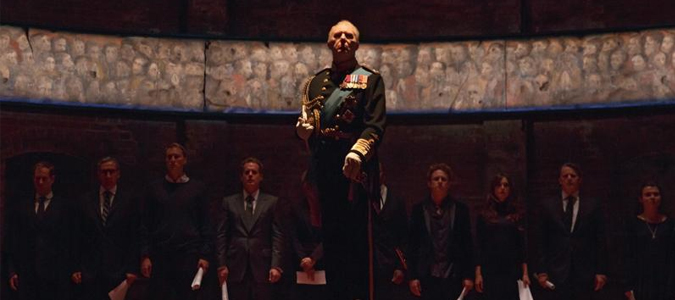

King Charles III
Opening Night: November 1, 2015
Closing: January 31, 2016
Theater: Music Box Theatre
Somewhere in the not too distant future, Charles, who has spent more than a lifetime patiently waiting for power as the Prince of Wales, finally ascends the throne. But all is not as the new monarch expected it to be, in this controversially brave new play from Mike Bartlett. How to rule this new tumultuous country? Inspired by the histories of Shakespeare, “King Charles III” has bowled over the Brits, and now transfers to the great white way in search of equal success.
BUY TICKETSREAD THE REVIEWS:
November 1, 2015
To sign, or not to sign. That is the question that hangs so urgently over the wavering title character of “King Charles III,” Mike Bartlett’s flat-out brilliant portrait of a monarchy in crisis, which blazed open on Sunday night at the Music Box Theater. Any echoes you may infer regarding a certain Danish prince are entirely appropriate to this dazzlingly presumptuous drama, set in and around Buckingham Palace in a highly foreseeable future. True, as a product of the 20th century, the newly anointed King Charles — whom you probably know better as the current Prince of Wales — would seem to have more in common with T S. Eliot’s muddling J. Alfred Prufrock, who sadly recognized he was not “Prince Hamlet, nor was meant to be.” Yet as portrayed by Tim Pigott-Smith, in a fully fleshed performance that finds heroic dimensions in one man’s misguided bid for greatness, this unsteady monarch acquires a pathos that might indeed be called Shakespearean. Yes, it’s only a pen he holds, not a sword, as he stares at the unsigned documents before him. But in that pen lies the power to divide a nation and to erase a king’s identity.
READ THE REVIEWNovember 1, 2015
Church bells peal. A dozen actors in modern dress, carrying candles, enter; the set suggests a medieval chapel, with a band of faded ancestors looking on from peeling frescos. The actors sing a mournful Agnus Dei, accompanied by a busy sound tape and two live musicians in a box at the Music Box. The actors then launch into a Shakespearan tragedy, one of those “King” plays; not “King Lear” or “Richard II,” but “Charles III.” At least, it seems like Shakespeare, to the uninitiated, until the oldest man on stage says, “It’s not the same, Camilla.” We instantly know that this is not one of Will’s kings in one of Will’s plays; the King Charles in question is you-know-who. Yes, mum has died after a 60-year reign, leaving the Prince of Wales suddenly thrust onto the throne for which he has prepared his entire life. All your favorites are there. William, Harry, Kate, even the ghost of Diana, who roams the halls at night like one of the three weird witches of Macbeth. Charles faces his dilemma like Hamlet, but within two hours he has turned into an ineffectual Lear.
READ THE REVIEWNovember 1, 2015
The kingdom is uneasy. The monarch grows more isolated by the day. The ghost of a dead royal prowls the castle. Meanwhile, advisers plot the king’s downfall and the prince seems unsure what to do. Shakespeare? Not quite. The king in question is the current Prince of Wales and the prince is his eldest son, William. The ghost is none other than Diana, who glides about and spouts unclear prophecies. Playwright Mike Bartlett’s vibrant and thrilling “King Charles III” opened Sunday at the Music Box Theatre, borrowing much of The Bard’s style and symbols but looking to the near future. It crackles with intrigue and ideas. Much like “Hamilton” uses hip-hop and R&B to retell the story of Alexander Hamilton, Bartlett borrows England’s greatest writer to frame a tale about what might happen when the current English queen dies. Bartlett uses verse and iambic pentameter to spin his web, leaning on “Macbeth” and “Richard III” and “King Lear.” (Spotting the Shakespeare references might be a side joy here: Hey, was the kebab vendor a riff on the gravedigger in “Hamlet”?)
READ THE REVIEWNovember 1, 2015
Anyone old enough to remember Tim Pigott-Smith in the 1984 British television classic, “Jewel in the Crown,” will likely feel a frisson of satisfaction when the actor, playing the title role in “King Charles III,” lashes into Prince William about the tendency of the young to patronize rather than support their elders. But don’t get too comfortable. That takedown of youthful superiority is slowly negated by crushing reality as the treachery of Mike Bartlett’s ingenious “future history play” kicks in, turning this ballsy faux Shakespearean exercise from sardonic provocation into gut-wrenching tragedy. An Olivier Award-winning hit in London’s West End, where it transferred from the Almeida Theatre, the play arrives on Broadway the same year as Peter Morgan’s The Audience, which starred Helen Mirren as Queen Elizabeth II, chronicling six decades of weekly meetings with her Prime Ministers. King Charles III, a fantasy set in the immediate wake of Elizabeth’s death, is an ideal companion piece.
READ THE REVIEWNovember 1, 2015
For the living playwright working in English, William Shakespeare vexes. Whether you think his global stature oppressive or admire the works as antique phenomena with little bearing on today’s dramaturgical needs, the legacy must be dealt with. In the academy, they dissect him along ideological lines; high-concept, modern settings are de rigueur; and now Oregon Shakespeare Festival has commissioned “translations” of the 36 plays. Much less common is rigorous study and emulation, the path taken by Mike Bartlett in his audacious, madly engaging verse drama, “King Charles III.” Writing five acts mostly in iambic pentameter, Bartlett plugs directly into a tradition that uses scintillating metered poetry to connect the fortunes of a nation to the torments of a family. Had this speculative tale of Prince Charles ascending to the throne after Elizabeth II’s death been executed in prose, it would have been a mere “state of the nation” British drama with a bit of satirical cheek. Actors playing tabloid icons like Camilla, Kate and raffish Prince Harry elicit knowing chuckles on first entrance, but once they start spouting Bartlett’s meaty, incisive lines, you settle into a deep-listening groove.
READ THE REVIEW




















